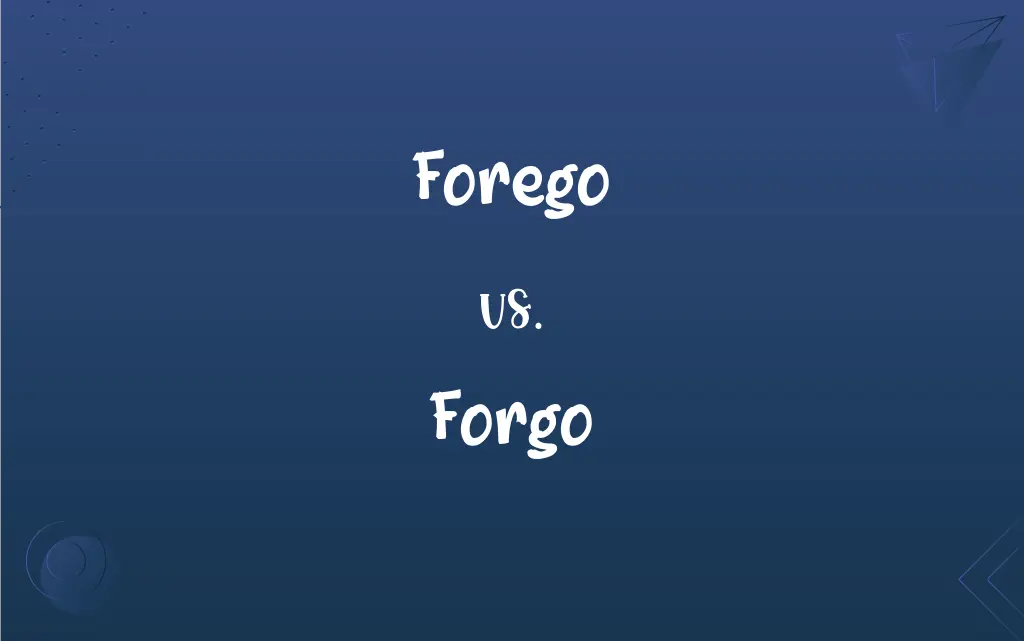Forego vs. Forgo: What's the Difference?
Edited by Aimie Carlson || By Harlon Moss || Updated on October 22, 2023
"Forego" means to precede in place or time, while "forgo" means to abstain from or do without.

Key Differences
"Forego" and "forgo" are two words that often cause confusion, primarily because they sound alike. "Forego" pertains to something that comes before, relating to precedence in time or order. On the other hand, "forgo" is about choosing not to do or have something.
When considering the origins and etymology, "forego" combines the prefix "fore-" which implies "before" with "go", suggesting going before or preceding. In contrast, "forgo" doesn't carry this prefix and directly relates to the act of abstaining or refraining.
To illustrate with an example, if one was to "forego" an event, it would imply that their participation or involvement was before others. However, if one chose to "forgo" an event, it would mean that they decided not to attend or partake in it at all.
In many contexts, "forgo" is more frequently used as it commonly deals with decisions to refrain from specific actions or to abstain from certain pleasures or luxuries. "Forego", being about precedence, has a narrower application, usually relating to something that happened or existed earlier.
In summary, while both "forego" and "forgo" can cause some linguistic mix-ups, remembering that "forego" deals with preceding and "forgo" deals with abstaining can clarify their respective uses.
ADVERTISEMENT
Comparison Chart
Primary Meaning
To precede in place or time.
To abstain from or do without.
Etymological Root
"Fore-" meaning "before" + "go".
Derived from "go".
Example Usage
Foregoing the introduction.
Forgoing dessert.
Associated Action
Being or happening earlier.
Refraining or abstaining.
Frequency of Use
Less common, specific to preceding.
More common, broad abstention context.
ADVERTISEMENT
Forego and Forgo Definitions
Forego
To precede in time.
The prologue will forego the main story.
Forgo
To bypass or omit.
They chose to forgo the usual formalities.
Forego
To be earlier or prior to.
Breakfast will forego lunch.
Forgo
To abstain or refrain from.
I'll forgo dessert today.
Forego
To predate or antecede.
Dinosaurs forego humans in Earth's timeline.
Forgo
To pass up or do without.
He had to forgo his vacation due to work commitments.
Forego
To be in advance of.
Preliminary meetings will forego the main conference.
Forgo
To give up or relinquish.
He decided to forgo his claim to the property.
Forego
To come before in order.
The introduction will forego chapter one.
Forgo
To decide not to do or use.
She chose to forgo makeup this morning.
Forego
To precede, as in time or place. See Usage Note at forgo.
Forgo
To abstain from; relinquish
Unwilling to forgo dessert.
FAQs
Can "forgo" mean to donate or give away?
Not directly. "Forgo" is about abstaining or giving up for oneself, not giving to others.
Can "forego" be about spatial order?
Yes, "forego" can indicate something coming before another in order or space.
Is "foregoer" a valid word?
While not common, "foregoer" can mean someone or something that goes before another.
Does "forego" always relate to time?
Mostly, but it can also pertain to order or sequence.
Can someone "forgo" a treatment or medication?
Yes, it means they chose not to undergo the treatment or take the medication.
Is "forgo" only about giving up pleasures?
No, "forgo" can be about abstaining from anything, not just pleasures.
If I skip breakfast, do I "forego" or "forgo" it?
You "forgo" breakfast because you're choosing to skip or do without it.
Is "forgo" a formal term?
While not strictly formal, "forgo" is standard English and can be used in various contexts.
Can a business "forgo" an opportunity?
Yes, it means the business chose not to pursue or take advantage of it.
Are "forego" and "forgo" interchangeable?
No, "forego" means to precede, while "forgo" means to abstain from or do without.
Can "forego" be used in a future context?
Yes, but it would still imply something preceding another event, even if both are in the future.
Can an event "forego" another?
Yes, if it happens or is scheduled before another event.
Can I "forgo" a right or claim?
Yes, it means you choose to not exercise or claim it.
If I arrive early, did I "forego" others?
Yes, by arriving early, you preceded or "forewent" others.
Is "forgoing" the act of abstaining?
Yes, "forgoing" is the gerund form of "forgo", indicating the act of abstaining or doing without.
Does "forego" have any synonyms?
Yes, synonyms include precede, antecede, and predate.
Is "forgone" related to "forgo"?
Yes, "forgone" is the past participle of "forgo", meaning having abstained or refrained from something.
Is "foregone" related to "forego"?
Yes, "foregone" is the past participle of "forego", often seen in the phrase "foregone conclusion".
What is the opposite of "forgo"?
To embrace, pursue, or partake in.
Can an introduction "forego" a chapter?
Yes, if the introduction comes before the chapter, it "foregoes" it.
About Author
Written by
Harlon MossHarlon is a seasoned quality moderator and accomplished content writer for Difference Wiki. An alumnus of the prestigious University of California, he earned his degree in Computer Science. Leveraging his academic background, Harlon brings a meticulous and informed perspective to his work, ensuring content accuracy and excellence.
Edited by
Aimie CarlsonAimie Carlson, holding a master's degree in English literature, is a fervent English language enthusiast. She lends her writing talents to Difference Wiki, a prominent website that specializes in comparisons, offering readers insightful analyses that both captivate and inform.































































